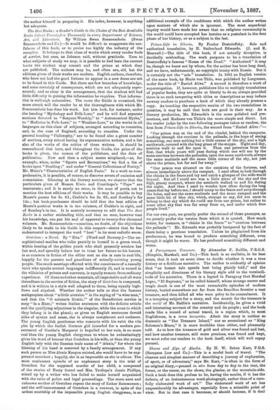CURRENT LITERATURE.
We are very glad to see a new English edition, prepared by Pro- fessor A. H. Keane, of Dr. Rudolf Gneist's Student's History of the English Parliament. (H. Grevel and Co.) It is not as important a work as the same author's " History of the English Constitution," which was some time ago reviewed at length in our columns. But it is a careful, scholarly, and yet popular account—so far as anything- from the pen of Professor Gneist can be said to be popular—of the growth and development of the British Constitution for upwards of a thousand years,—that is to say, from 800 to 1887. It is advisable that we should see ourselves as a well-read outsider, who is yet an "all-fibre" Teuton, as Mr. Gladstone is an "all-fibre" ficotehman, sees us. This book was written in the first instance for students, who will find it eminently methodical, and who cannot do bettor than read it after perusing some one of the books in English prescribed to them, such as Mr. Tsawell Langmead's history. Readers of this sort— and, indeed, all readers—may, if they choose, skip Professor Gneist's speculations as to the future of England and of the English Constitu- tion. Here is a sentence, however, that is worth quoting for its suggestiveness :—"The daily Press dwells in a fool's paradise and. self-oblivion as to the vital conditions of the State, as if the question of To he, or not to be ?' of the Parliamentary Constitution were still to be decided, with a sort of Papal infallibility, by mere force of public opinion. All moves as formerly in France and Germany, when on the very brink of the preoipice." Professor Keane has taken the most effectual means to make the new English edition of Professor Gneist's work perfectly satisfactory by securing the oo-operation of
the author himself in preparing it. His index, however, is anything but adequate.



















































 Previous page
Previous page